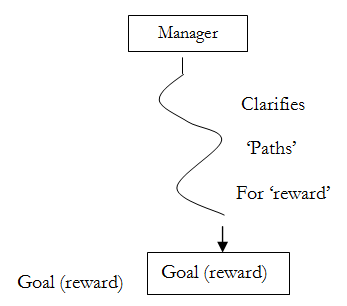Path-Goal Theory Of Leadership
by Martin G Evans and Robert J. House (1971)

This theory was developed by the above said persons in 1971. The Path-goal approach to leadership effectiveness is based on the expectancy/valence model that states that “An individuals motivation depends on his or her expectation of the reward and the valence or attractiveness of that reward.”
This theory focuses on the leader as the source of rewards.
It attempts to predict how different types of rewards and different leadership styles affect motivation, performance and satisfaction of subordinates. Managers have at their disposal a number of ways to influence subordinates. According to Evans the most important are the managers ability to provide rewards and to clarify what subordinates must do to earn them. Thus managers determine the valibility of “goals” (rewards) and make clear the “paths” to be taken to reach them. Evans suggests that a managers leadership style influences which rewards will be available to subordinates as well as subordinates perceptions of what they have to do to earn those rewards. An employee centred manager for example will offer a wide range of reward to subordinates not only pay and promotions but also support encouragement, security and respect.
A task oriented manager on the other hand will offer less set of rewards. However according to Evans such a manager will usually be much better at linking subordinates performance to rewards than an employee centred manager.